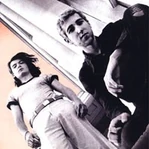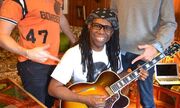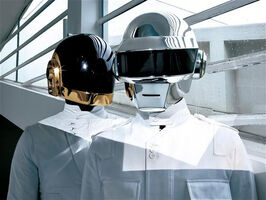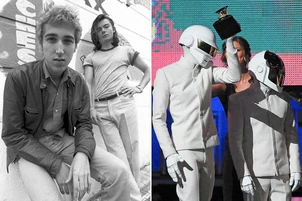Daft Punk is the name of two musicians/directors, Guy-Manuel de Homem-Christo and Thomas Bangalter. The duo has released four studio albums, several singles, music videos and a full-length movie. The duo originated in France and have been active since 1993.
History
Early years (1987–1993)
Thomas Bangalter and Guy-Manuel de Homem-Christo met in 1987 while attending the Lycée Carnot, a secondary school in Paris.[1][4] The two became good friends and later recorded demo tracks with others from the school. This eventually led to the formation of the guitar-based group called Darlin' with Laurent Brancowitz in 1992.[5] Bangalter and de Homem-Christo played bass and guitar, respectively, while Brancowitz performed on drums.[6] The indie rock trio had branded themselves after The Beach Boys song of the same name, which they covered along with an original composition.[7] Stereolab released both tracks on a multi-artist Duophonic Records EP and invited the band to open for stage shows in the United Kingdom.[7][8] Bangalter felt that "The rock n' roll thing we did was pretty average, I think. It was so brief, maybe six months, four songs and two gigs and that was it."[9] A negative review in Melody Maker subsequently dubbed the music "a bunch of daft punk." Instead of dismissing the review, they found it to be amusing.[4] As de Homem-Christo stated, "We struggled so long to find [the name] Darlin', and this happened so quickly."[10] Darlin' soon disbanded, leaving Brancowitz to pursue other efforts with Phoenix.[5] Bangalter and de Homem-Christo formed Daft Punk and experimented with drum machines and synthesizers.
Homework era (1993–1999)
- Main article: Homework#Recording History
In 1993 Daft Punk attended a rave at EuroDisney, where they met Stuart Macmillan of Slam, co-founder of the label Soma Quality Recordings.[4] The demo tape given to Macmillan at the rave formed the basis for Daft Punk's debut single, "The New Wave", a limited release in 1994.[9] The single also contained the final mix of "The New Wave" called "Alive", which was to be featured on their first album.
Daft Punk returned to the studio in May 1995 to record "Da Funk". It became their first commercially successful single the same year. After the success of "Da Funk", Daft Punk looked to find a manager. They had no trouble finding one at the time as they chose Pedro Winter, who regularly promoted them and other artists at his Hype night clubs.[6] The band signed with Virgin Records in September 1996 and made a deal through which they licensed their tracks to the major label through their production company, Daft Trax.[1][6] Bangalter spoke of the duo's decision to sign with Virgin: Many record companies offered us deals. They came from everywhere, but we decided to wait--partly because we didn't want to lose control of what we had created. We turned down many record companies. We weren't interested in the money, so we turned down labels that were looking for more control than we were willing to give up. In reality, we're more like partners with Virgin.[11] {C In regards to the artistic control and freedom, Bangalter stated: {C We've got much more control than money. You can't get everything. We live in a society where money is what people want, so they can't get the control. We chose. Control is freedom. People say we're control freaks, but control is controlling your destiny without controlling other people. We're not trying to manipulate other people, just controlling what we do ourselves. Controlling what we do is being free. People should stop thinking that an artist that controls what he does is a bad thing. A lot of artists today are just victims, not having control, and they're not free. And that's pathetic. If you start being dependent on money, then money has to reach a point to fit your expenses.[11] "Da Funk" and "Alive" were later included on Daft Punk's 1997 debut album Homework. The album was regarded as an innovative synthesis of techno, house, acid house and electro styles, and is widely acknowledged as one of the most influential dance music albums of the nineties. "Da Funk" was also included on The Saint film soundtrack. It was during this period of change in dance music that Daft Punk became largely successful. They combined the aforementioned music styles with crowd pleasing elements of rave. The most successful single from Homework was "Around the World", which is known for the repeating chant of the song's title. Daft Punk also produced a series of music videos for Homework directed by Spike Jonze, Michel Gondry, Roman Coppola and Seb Janiak. The collection of videos was released in 1999 and titled D.A.F.T.: A Story About Dogs, Androids, Firemen and Tomatoes.
Discovery era (1998–2004)

Daft Punk Unmasked
By 1998 the duo were well into the recording sessions for their second album, which had begun a year earlier.[12] The 2001 release Discovery took on a slicker and distinctly synthpop-oriented style, initially stunning fans of Daft Punk's previous material in Homework. The group states that the album was conceived as an attempt to reconnect with a playful, open-minded attitude associated with the discovery phase of childhood.[8] This accounts for the heavy use of themes and samples from the late '70s to early '80s era on the album. It reached #2 in the United Kingdom, and its single "One More Time" was a major club and mainstream hit, which nearly topped the UK Singles Chart. The song is well known for being heavily auto-tuned and compressed.[8] The song and album created a new generation of fans mainly familiar with the second Daft Punk release. The singles "Digital Love" and "Harder, Better, Faster, Stronger" were also very successful in the UK and on the United States dance chart, and "Face to Face" hit #1 on the USA club play charts despite a limited single release.[13] A 45-minute excerpt from a Daftendirektour performance recorded at Birmingham, UK in 1997 was also released in 2001, entitled Alive 1997. 2003 first saw the release of the feature-length animated film Interstella 5555: The 5tory of the 5ecret 5tar 5ystem. Daft Punk produced the film under the supervision of Leiji Matsumoto, whom they have said is their childhood hero.[14] The album Daft Club was also released to promote the film. It features a collection of remixes previously made available through an online membership service of the same name.
Human After All era (2004–2008)
Starting on September 13 and ending November 9, 2004, Daft Punk devoted six weeks to creating new material.[15] The duo released the album Human After All in March 2005. Reviews were mixed, mostly citing its overly repetitive nature and seemingly rushed recording. The singles taken from this album were "Robot Rock", "Technologic", "Human After All", "The Prime Time of Your Life" and "The Brainwasher". The earliest official statement from Daft Punk concerning the album was "we believe that Human After All speaks for itself."
A Daft Punk anthology CD/DVD entitled Musique Vol. 1 (1993-2005) was released on April 4, 2006. It contains new music videos for "The Prime Time of Your Life" and "Robot Rock (Maximum Overdrive)". Daft Punk also released a remix album of Human After All called Human After All: Remixes. A limited edition included two kubricks of Daft Punk as robots.
On May 21, 2006, Daft Punk premiered their first directed film, Daft Punk's Electroma at the Cannes Film Festival sidebar Director's Fortnight.[16] The film does not include their own music, which is a first for the duo considering their previous DVD and film releases (D.A.F.T. for Homework and Interstella 5555 for Discovery). Midnight screenings of the film were shown in Paris theaters starting from the end of March 2007.[17] Initial public comments have since been positive.[18]
Daft Punk released their second live album titled Alive 2007 on November 19, 2007. It contains the duo's performance in Paris from their Alive 2007 tour.[19] The live version of "Harder, Better, Faster, Stronger" from Alive 2007 was released as a single.[20] A music video for the single directed by Olivier Gondry features footage shot by 250 audience members at Daft Punk's Brooklyn appearance at KeySpan Park, Coney Island.[21]
Tron: Legacy (2008–2010)
Following the Alive 2007 tour, Daft Punk focused on other projects. A 2008 interview with Pedro Winter revealed that the duo returned to their Paris studio to work on new material. Winter also stepped down from managing Daft Punk to focus attention on his Ed Banger Records label and his work as Busy P.[22] He stated in a later interview that the duo are working with an unspecified management company in Los Angeles.[3] Jamie Stevens of Infusion commented that Daft Punk had rented the Jim Henson Studios for one month to record material for a new album, adding, "Who know[s] if it will ever come out though?"[23] In 2008 Daft Punk placed 38th in a worldwide official poll of DJ Magazine after debuting at position 71 in 2007.[24] On February 8, 2009, Daft Punk won Grammy Awards for Alive 2007 and its single "Harder, Better, Faster, Stronger".
Daft Punk provided eleven new mixes featuring their music for the video game DJ Hero. They also appear in the game as playable characters, along with their own venue. The duo appear wearing their Discovery-era helmets and Human After All-era leather attire.[25]
In March 2009, it was announced Daft Punk was signed to write the score to the film Tron: Legacy[26][27] At the 2009 San Diego Comic-Con, it was announced that the duo composed 24 tracks for the film.[28] Daft Punk will make a cameo appearance in the film as disc jockey programs at a nightclub within the film's virtual world.[29] Tron: Legacy co-star Olivia Wilde also stated that the duo may be involved with future promotional events related to the film.[30][28]
Random Access Memories (May, 21 2013)
Main Article: Random Access Memories

Photo taken on February 8th, 2012. From right to left: Guy-Manuel de Homem-Christo, Nile Rodgers (down) and Thomas Bangalter
Speculations from the album came in early 2007, when the band had just finished the tour. In 2008, it was revealed by Busy P that the band is already in the studio recording new material, but this was later meant to be the Tron: Legacy soundtrack.
Since 2011, artists such as: Panda Bear, Chilly Gonzales, and more recently (as of February 2012), Paul Williams and Nile Rodgers.
Williams has confirmed his collaboration in two different interviews, and in his blog. He stated he has been "writing some tunes for them".
Rodgers has also mentioned them in various interviews, with even a photo was taken.
The genre has been said to be a mixture of House, Soul, and R&B.
The album became known for the fastest selling album in the whole world.
Fans have been waiting for this album for over 8 years and it has finally come.
Logo
The logo is credited to be designed by Guy-Manuel de Homem-Christo in the liner notes of Homework.
Videogames
Daft Punk has very rare appereances in videogames like:
- Just Dance 3
- Just Dance 4
- DJ Hero 2
| This page uses Creative Commons Licensed content from Wikipedia (view authors). |


